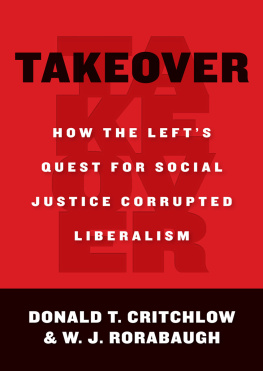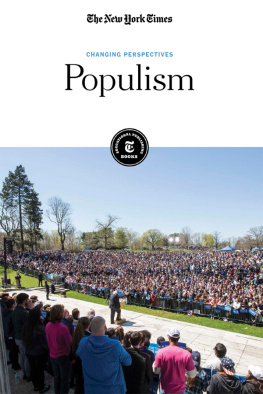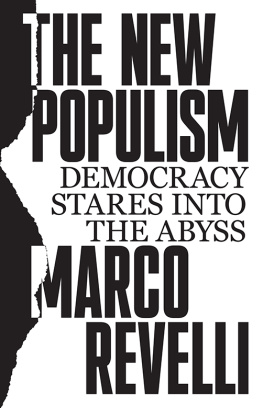Donald T. Critchlow - In Defense of Populism: Protest and American Democracy
Here you can read online Donald T. Critchlow - In Defense of Populism: Protest and American Democracy full text of the book (entire story) in english for free. Download pdf and epub, get meaning, cover and reviews about this ebook. year: 2020, publisher: University of Pennsylvania Press, genre: Politics. Description of the work, (preface) as well as reviews are available. Best literature library LitArk.com created for fans of good reading and offers a wide selection of genres:
Romance novel
Science fiction
Adventure
Detective
Science
History
Home and family
Prose
Art
Politics
Computer
Non-fiction
Religion
Business
Children
Humor
Choose a favorite category and find really read worthwhile books. Enjoy immersion in the world of imagination, feel the emotions of the characters or learn something new for yourself, make an fascinating discovery.
- Book:In Defense of Populism: Protest and American Democracy
- Author:
- Publisher:University of Pennsylvania Press
- Genre:
- Year:2020
- Rating:4 / 5
- Favourites:Add to favourites
- Your mark:
- 80
- 1
- 2
- 3
- 4
- 5
In Defense of Populism: Protest and American Democracy: summary, description and annotation
We offer to read an annotation, description, summary or preface (depends on what the author of the book "In Defense of Populism: Protest and American Democracy" wrote himself). If you haven't found the necessary information about the book — write in the comments, we will try to find it.
Donald T. Critchlow: author's other books
Who wrote In Defense of Populism: Protest and American Democracy? Find out the surname, the name of the author of the book and a list of all author's works by series.
In Defense of Populism: Protest and American Democracy — read online for free the complete book (whole text) full work
Below is the text of the book, divided by pages. System saving the place of the last page read, allows you to conveniently read the book "In Defense of Populism: Protest and American Democracy" online for free, without having to search again every time where you left off. Put a bookmark, and you can go to the page where you finished reading at any time.
Font size:
Interval:
Bookmark:

In Defense of Populism
In Defense of Populism
Protest and American Democracy
Donald T. Critchlow

Copyright 2020 University of Pennsylvania Press
All rights reserved. Except for brief quotations used for purposes of review or scholarly citation, none of this book may be reproduced in any form by any means without written permission from the publisher.
Published by
University of Pennsylvania Press
Philadelphia, Pennsylvania 19104-4112
www.upenn.edu/pennpress
Printed in the United States of America on acid-free paper
10 9 8 7 6 5 4 3 2 1
Library of Congress Cataloging-in-Publication Data
Name: Critchlow, Donald T., author.
Title: In defense of populism : protest and American democracy / Donald T. Critchlow.
Description: 1st edition | Philadelphia : University of Pennsylvania Press, [2020] | Includes bibliographical references and index. |
Identifiers: LCCN 2020006499 | ISBN 978-0-8122-5276-7 (hardcover)
Subjects: LCSH: PopulismUnited StatesHistory. | Social movementsUnited StatesHistory. | DemocracyUnited StatesHistory. | United StatesPolitics and governmentHistory.
Classification: LCC E183 .C877 2020 | DDC 320.56/620973
LC record available at https://lccn.loc.gov/2020006499
To my grandsons,
Alexander, Andrew, and Joshua, Critchlows all
Contents
Introduction Social Protest and Democracy
I protest. This book does not offer a defense of demagoguery, xenophobia, racism, or illiberalismthe dark side often associated with populism in the American political tradition.
In Defense of Populism challenges didactic accounts of populism as either simply expressions of the oppressed demanding that the democratic dream be realized or anxiety-ridden, anti-intellectual, paranoid, anti-democratic reactions to a changing order.
Instead, this book submits that grassroots activist movementspopulist movements, if you willare essential to American democracy. At decisive points in American politics, social protest movementswhether on the left or the rightforce established parties and leaders to bow to reform. In this way, anti-elitist social protest becomes absorbed by established powers. At the same time, the demands for democratic reform become institutionalized in the modern American state, ironically creating an enlarged bureaucratic government that is further removed from the people. This progression from protest to political absorption to institutionalization is evidenced in critical episodes in the American reform tradition. Indeed, American history is replete with these cycles of political disequilibrium followed by stabilization.
In arguing for the necessary importance of populism to political reform, this book explores specific episodes in modern American history that reveal the interplay of populist social action and party reform: agrarian populism in the late nineteenth century, anti-corporatism in the Progressive Era, class protest during the New Deal, the struggle for black equality in the early Cold War era, second-wave feminism in the 1970s, and anti-statist New Right protest in the late twentieth century. The creation of the modern regulatory and welfare administrative state, managed and overseen by seemingly distant bureaucrats, accelerated anti-elitist, populist reactions on the ideological right and left, which have become more pronounced in the last decades of the twentieth century and today.
A sizable cottage industry has attempted to define populism, but even critics find the term difficult to define precisely. For the purposes of this book, populism is presented as grassroots activism expressed in social movements against established elites and a call for citizens to be given a larger voice in politics. In offering this rather narrow definition, this book provides less a taxonomy of populist grassroots movements than an argument for the importance of grassroots activism, as disquieting as it is to its critics, as essential to democratic reform in the American political tradition. By relying on a simple definition that views populist social movements as expressions of anti-establishment and anti-elitism, we gain the opportunity to examine the role mass social protest plays in the larger American political tradition. In this way, populism need not be defined as an elaborate ideology or comprehensive political program but as a manifestation of mass hostility toward sociopolitical elites who are seen as unfairly benefiting from the status quo.
Popular demand for political and economic reform can gestate for long periods, often reaching an intensity around, but not totally dependent on, a national crisis. The power of these grassroots movements through mobilization forces established parties to respond by accommodation, concession, preemption, and absorption of reform demands. The period in which social mobilization occurs is characterized by protest, political turmoil, and often violence. Protest, social disruption, and violence often coincide with these mass social mobilizations. In response to disruption, ultimately the general public loses sympathy for the agitators and demands the restoration of social order. Marked discord and turmoil characterize the period of disequilibrium before political parties and leaders turn to reform as a means of stabilizing society. Before political equilibrium is restored, however, a sense of profound disquiet prevails in society. Social and political discord is intensified.
Those living in these periods of disquiet experience profound anxiety that the world is being turned upside down and is coming apart. In such tumultuous times, the nation itself appears in free fall. Grassroots activismpopulist protest against established political and economic elitesbrings class resentment, social conflict, protest, and violence. Such times allow a platform for cranks as well as religious and social visionaries with schemes to make the world perfect. In this environment, conspiracy theorists of various sorts attract audiences who in the past would have ignored them. Cranks, visionaries, and activist followers unite around the rhetoric of anti-elitism and taking back power in the name of the people. Anti-party sentiment, denunciations of political corruption, and economic cabals manifest themselves in grassroots activism. Strong tendencies toward third-party formation find expression, as seen in the Peoples Party, the Progressive Party, and the Socialist Party, and later postwar parties including the Reform Party, the Libertarian Party, and the Green Party.
Grassroots social movements present odd mixtures of conservative and progressive tendencies but share anti-party sentiment in their origins. A consideration of the ways anti-party activism and the tendency toward third-party formation lead to establishment party revival invites fuller exploration. In the process, political discord expressed by grassroots activism emerges as political accord as an established party responds to voter discontent. Essential to this process of discord and reform are politicians who take up activist causes to force changes within their parties. These politicians can be motivated by both genuine concern and political calculation.
Any era of reform produces uneasy coalitions. For example, the Progressive Era, from 1901 to 1917, brought together middle- and upper-class good-government people, prohibitionists, labor, Single Taxers, socialists, agricultural and urban interests, pacifists, and imperialists. Inevitably, many grassroots leaders, especially visionary types, felt that the reforms did not go far enough and concluded that they had been betrayed by opportunistic political leaders and sellouts in their own movements. Nonetheless, these grassroots movements proved essential to reform.
Next pageFont size:
Interval:
Bookmark:
Similar books «In Defense of Populism: Protest and American Democracy»
Look at similar books to In Defense of Populism: Protest and American Democracy. We have selected literature similar in name and meaning in the hope of providing readers with more options to find new, interesting, not yet read works.
Discussion, reviews of the book In Defense of Populism: Protest and American Democracy and just readers' own opinions. Leave your comments, write what you think about the work, its meaning or the main characters. Specify what exactly you liked and what you didn't like, and why you think so.











